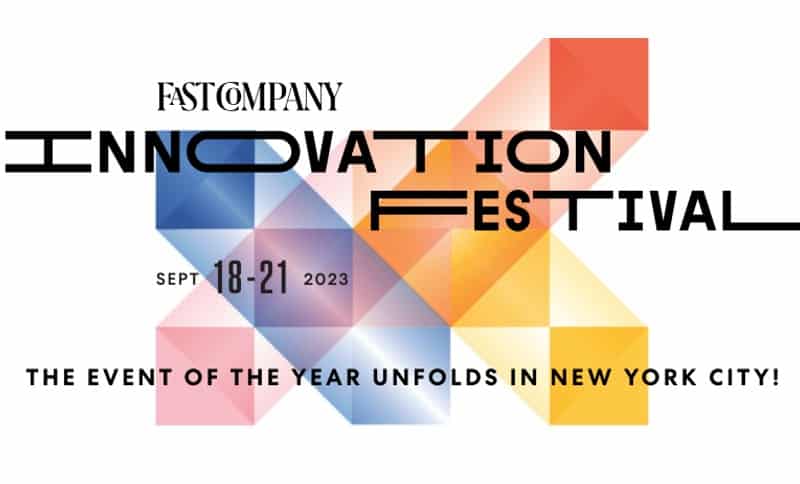New York’s 2023 Fast Company Innovation Festival has seen creative thinkers from all over the world attend Manhattan’s Financial District for the 9th annual event. Celebrity headliners include Halle Berry, Gabrielle Union, Tracee Ellis Ross, and Christy Turlington Burns.
The Festival kicked off on Monday with the opening of their “Fast Tracks”, welcoming attendees into the offices of some of the world’s biggest brands. Panels and headline speakers commenced on Tuesday.
See Also: Fast Company Innovation Festival: Ray Dalio, Lidiane Jones, Slutty Vegan, and Clare V.
See Also: Fast Company Innovation Festival: Hartbeat, Tracee Ellis Ross, Google, Snap Inc., and Airbnb
Mediaweek continued its in-person coverage, attending key sessions throughout the final day. Here is a recap of the highlights:
Proudly Inclusive: Inside Gabrielle Union and Dwyane Wade’s new venture
In 2022, actress Gabrielle Union, and former pro basketball player, Dwyane Wade officially launched their baby care brand, PROUDLY, that caters to the needs of Black and brown babies. Executive director of editorial programming at Fast Company, Kc Ifeanyi invited the duo to the stage to speak about the past, present, and future of the brand.
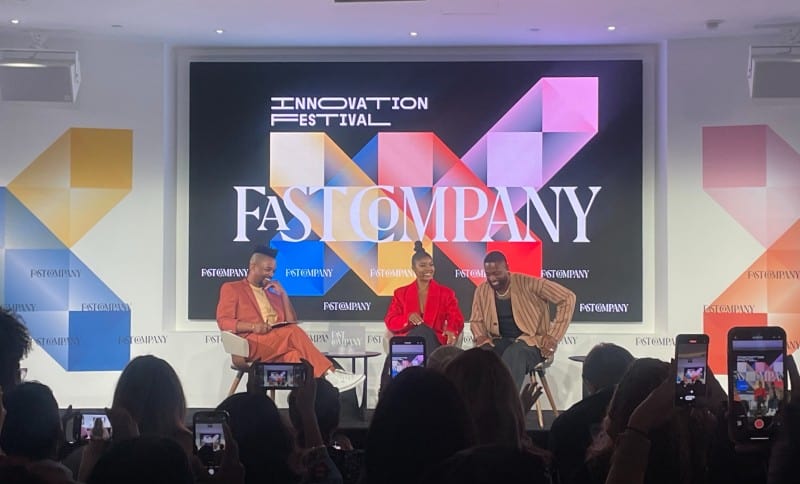
It was Union’s experience as a first time mother that led to her identifying the disparity in products and education available to properly care for babies with melanated skin. She spoke about the time when she had to rely on “all these different products, like a cocktail, to address a black child’s diaper rash.”
Union also remembered being concerned by the safety standards; “Everything that I’ve seen geared just for babies period, most of them are not EWG certified… So we [at PROUDLY] wanted to set the bar extremely high.”
While catering to the product and safety needs of the Black and brown community was the original idea that started PROUDLY, the North star has been the inclusivity of their community. That has placed the products “at the intersection of affordability and efficacy,” as Ifeanyi said.
Union agreed saying that, “This isn’t a celebrity brand, this is a community brand.”
“The brand ethos for all of our brands is community outreach, so we have to be in the community and of the community.
“Very few brands, their ‘why?’ matches their ‘how’. If your ‘why?’ is to meet the needs of Black and brown babies, and you get into the ‘how’ and there’s no alignment, that’s exploitation. You want our dollars but you don’t actually want to create a brand that is in and of the actual community you claim to want to serve.
“If you realise that there’s a big issue, a need, and then you come up with the solution, but people can’t afford the solution? That’s [also] exploitation.”
Wade added, “Our team has had a very tough time in trying to make sure we find that balance. I remember I was like, ‘if we’re going to build something for the Black and brown community, we cannot outprice the community. There’s no point in doing that.’”
For Wade, who admitted “I didn’t think there was a lot that I could bring to this brand,” a personal aspect of the brand journey has been the realisation of his influence as a man to challenge conventional gender roles in baby care.
Wade said, “I think what I’ve learned a lot in this process is the need for me to educate myself, to speak and talk to other men, other families. It’s not just about the product itself.”
Gut Check: Unlocking breakthroughs in the microbiome industry
Halle Berry was diagnosed with Type II diabetes in her early 20s, making health and well-being a major focus for the Hollywood A-lister. It was during her health journey that Berry came into contact with the products produced by Colleen Cutcliffe.
“My background could not be more opposite [to Berry’s],” said Cutcliffe, co-founder and CEO of Pendulum Therapeutics. “I have a background in pretty hardcore science research.”
That includes a PhD in biochemistry and molecular biology from Johns Hopkins, a postdoc at Northwestern University, and experience working in pharmaceuticals in San Francisco. “On the other side of it, I started this company, Pendulum,” Cutcliffe explained.
What started as casual consultations about branding and marketability evolved into Berry being brought on as Pendulum’s chief communications officer.
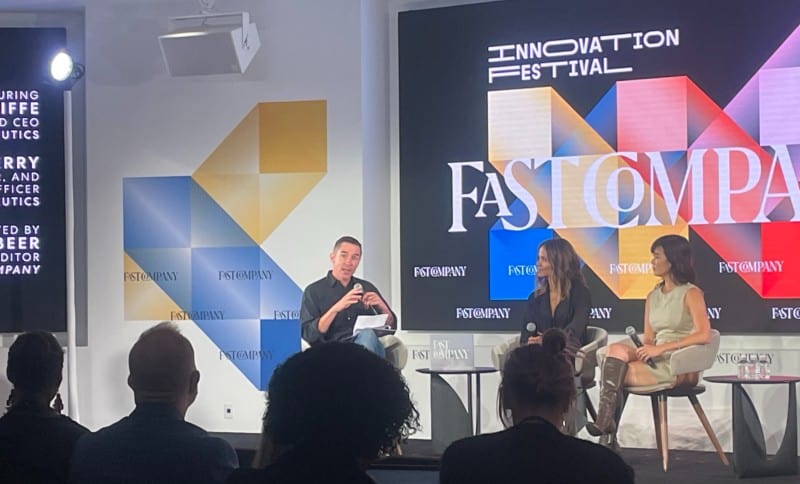
Berry said, “I wanted people to know they could change their sugar cravings, they could find a product that would help them get better sleep at night. They could help with their brain fog, it could heal their gut and in turn, heal many organs in your body.
“I asked [Cutcliffe], ‘Can I please be a part of this company in any way? How do you think you could use me to help?’”
“Actually, what you said was, ‘I love the product you’ve built, it has helped me in so many ways… but you don’t know anything about branding,’” Cutcliffe joked.
Moderator Jeff Beer, senior staff editor at Fast Company, asked Berry how this partnership differed from the usual celebrity brand endorsement, to which Cutcliffee said, “I think it’s very rare to meet somebody so incredibly accomplished that still has that humility, and them wanting to learn.
“I think that’s also been foundational to this relationship building because we’re both trying to learn from each other, and we’re trying to build this big vision together.”
Berry described how her involvement in Pendulum as CCO has been key in what she deemed the “second act” of her life and career. Berry said, “I am now becoming synonymous with Pendulum… People used to come up and say they loved this movie or that movie. Now they’re saying, ‘Hey! You got that Pendulum, right?’”
She went on, “Yes, I love that I can make a movie and people can have a night of entertainment. But what feels even more important to me is that I can really be a part of changing people’s lives in a real, substantive way.”
Most Innovative Companies: Creating communities and building brands
How do brands build fans? This was the question put to a panel of brand leaders who have managed to achieve just that.
Joining Jeff Beer on stage was Neal Arthur, CEO of Wieden+Kennedy (W+K). Ron Faris, GM and VP of Nike Virtual Studios, Kory Marchisotto, CMO of e.l.f. Beauty, and Andrew Yaffe, SVP and head of social, digital and original content at the National Basketball Association (NBA).
Faris discussed how Nike Virtual Studios was created to meet “the next generation consumer” where they were, saying that, “as they get younger, especially, [consumers] really require a lot more of that love and care about storytelling, and they tend to live in both worlds; a physical world, and a digital world.”
Yaffe noted how his social output at the NBA has also been shaped in recent years by shifting audience needs, “For us what’s become increasingly critical over the last few years is the expectation around a personalised experience for each fan.
“It’s gone from being a real broadcast to ‘how can I carve up that world into the exact fan experience I want?’ How do I follow the six players I love … or this team across the world?’”
Arthur, who has worked with global brands such as Nike, Ford, and McDonald’s at W+K, said that, “Now, the most loved brands are being created by their fans.”
See Also: Kelly Cooke named NBA’s head of content distribution for APAC
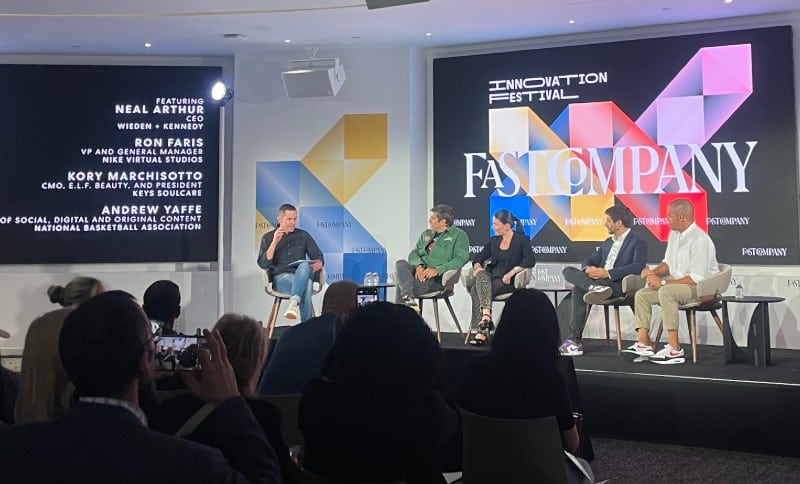
L to R: Jeff Beer, Ron Faris, Kory Marchisotto, Andrew Yaffe, Neal Arthur
Marchisotto, “chief mother e.l.f.er” – who was met with cheers coming from her travelling e.l.f. fan squad – addressed the session theme with two examples of building brand affinity through authentic engagement and responsive action.
Firstly, the consumer-centric saga of their Jelly Pop primer, originally part of a seasonal collection, that was reinstated as a full-time product due to demand. Marchisotto said, “We found that every time we would do a social post on anything, everybody was coming and saying ‘bring back Jelly Pop Primer, bring back Jelly Pop Primer! They didn’t stop.”
Having received criticism about the fragrance, the team introduced their Power Grip Primer. But the product was met with poor reception; a mystery that inspired Marchisotto to create the Jelly Pop Investigation series on TikTok.
The series welcomed audiences to collaborate on the full process of production, a conversation that spanned from diagnostics – understanding what resonated about the Jelly Pop product, and what needed to be improved – to consultations with e.l.f.’s department heads including their R&D, CFO, and, finally, their CEO.
Marchisotto told the audience how, “When the CEO approved it on a TikTok Live, what was really fascinating was the next day we did a post as usual, people came in and said, ‘Bring back Jelly Pop Primer!’. The people who were on the TikTok Live popped in and said, ‘The CEO was on yesterday, they’re bringing it back.’
She also described the results saying that, “The day we dropped this primer, it broke our website, it broke ULTA’s website. It was unbelievable.”
“You have to transcend ‘I’m here to sell you a product’. No, I’m here to have a relationship with you. In order for me to have a relationship with you, I need to know who you are, I need to know what you care about.
“I like to say we’re a brand of the people, by the people, for the people. For that to be true you have to create with the people.”
The second example involved leveraging a viral moment, aka “The Jeopardy Story.” E.l.f. capitalised on the defeat of the show’s reigning champion Matt Amodio who incorrectly guessed the beauty brand’s acronym to be “ears, lips, and face” rather than the correct eyes, lips and face.
“The most important part here was when you hit the cultural zeitgeist, in that moment, how do you react in real time?” said Marchisotto.
“Eight o’clock at night, all of us were on the phone [deciding] the action plan that we’re going to put into place immediately. The next morning, we woke up, we flipped our entire brand to ‘ears, lips, face.’ The whole brand, everywhere; websites, social channels, everything.”
She continued, “We brought Matt into the fold – this was Wednesday – e.l.f. and Jeopardy are now having a social media firestorm that’s absolutely hilarious. The community’s involved… Everybody’s talking about our acronym.”
“Finally, we had Matt in our corporate Town Hall. He had lost $8,000 when he got that question wrong, and we couldn’t have him lose money on our dime. So we actually gave him a check for the $8,000 that he lost to donate to the charity of his choice.
“This all happened between Tuesday night, and Friday morning. Had we done it two weeks later, three weeks later, four weeks later, the moment has passed, it’s over.”
In both cases Marchisotto emphasised the importance of a company architecture that facilitates audience interaction and participation.
She wrapped up by saying, “The fundamental component is really tapping in and actively listening, and then turning that back into content, actions, products, words, movements, and all of the things that are going to uniquely connect to that audience.”
Inside Netflix’s global content strategy
Editor-in-chief of Fast Company, Brendan Vaughan hosted the final headliners of the festival, Bela Bajaria, chief content officer at Netflix and Eric Newman, creator and executive producer of Grand Electric production company.
Newman’s latest Netflix-backed project, Griselda, was announced during the panel. Griselda Blanco was described by Newman as “a narcotics Queen Pin, and maybe the only real legitimate one there’s ever been.” Sofia Vergara will star as the titular inspiration for the series.
The conversation was centred around how the streaming service has found global success by supporting local productions.
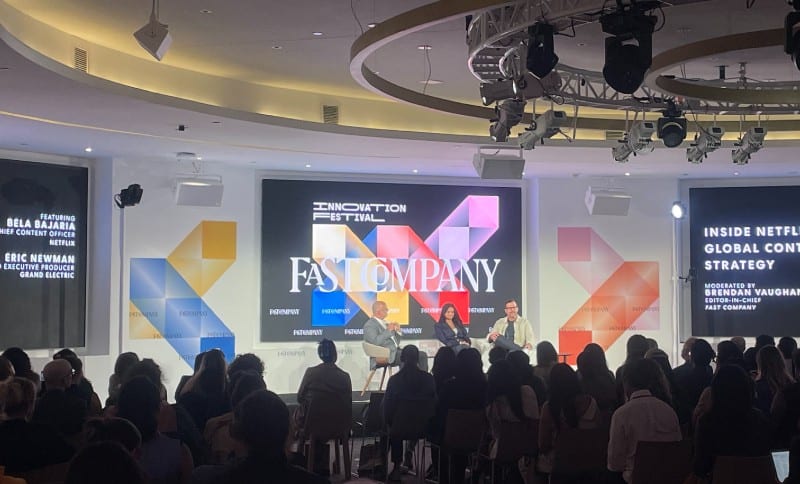
Bajaria said, “The shows and films that have really resonated and connected with people started with a very local, authentic point of view,” emphasising their content values of “authentic, local, and specific.”
When it comes to the Netflix productions that have transcended borders to become global sensations such as Squid Game or All Quiet on the Western Front, Bajaria said that it is never a goal from the offset. Rather, it will always be the universal human truths that elevate a property in such a way.
She said, “The ones that connect … that might travel, still always start with this core of authentic, local and specific. What we don’t do is we don’t make global shows, we make local shows and local films that we launch to a global audience.
“I think if you try and make something global, and you try to make something for everyone, you end up making something for no one.”
Asked to speculate on the future of the industry amidst the Writers Guild and SAG-AFTRA strikes, Newman said, “Honestly, everything I’ve speculated about in the past 130 days has been so wrong… There’s an old William Goldman adage that ‘nobody knows anything,’ and that’s doubly true.
“The most important thing, I think, is just getting past the rhetoric. This is a business that is deeply interdependent.”
See Also: Netflix begins production on epic outback drama Desert King (working title) in the NT and SA
